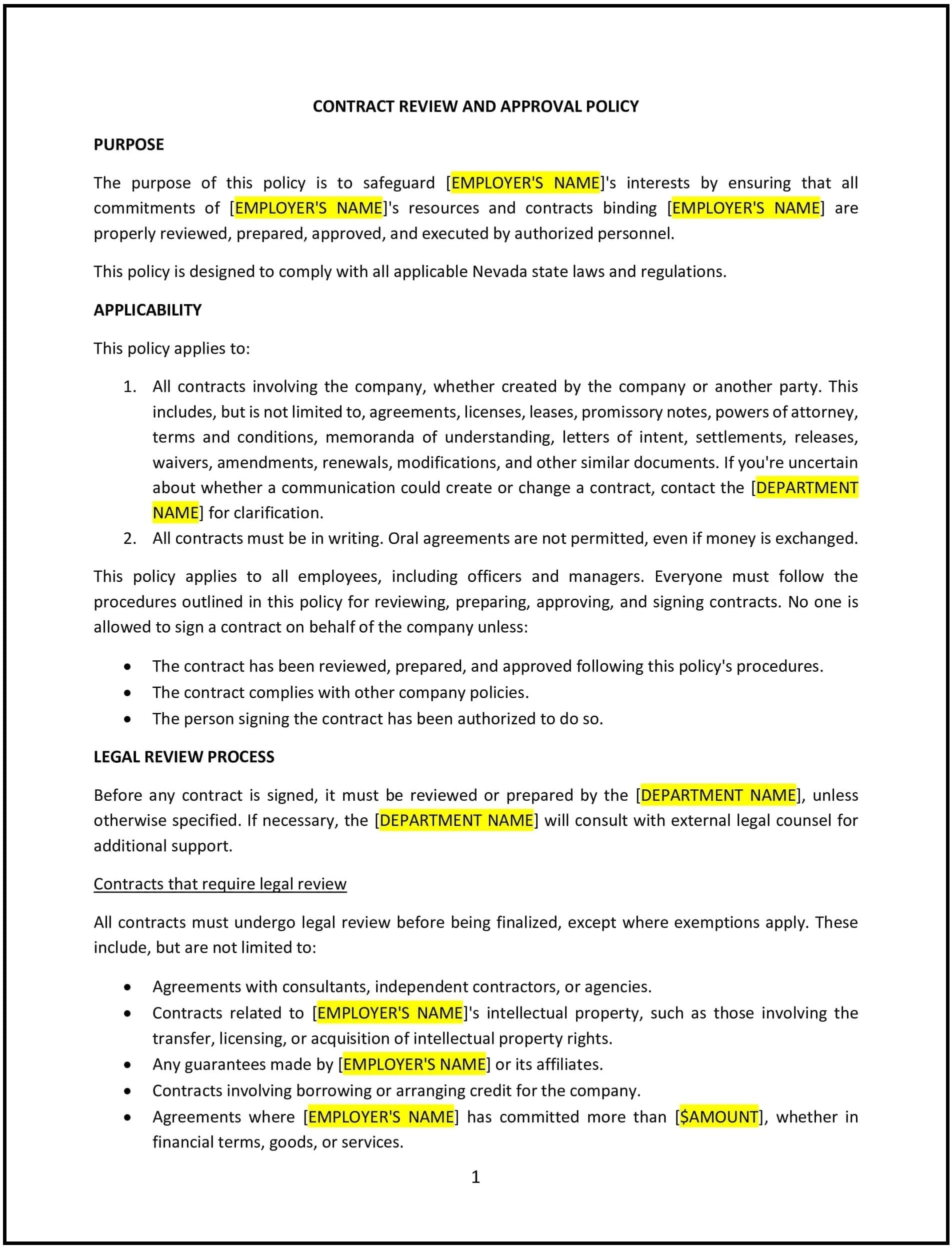Contract review and approval policy (Nevada): Free template
Got contracts to review? While you're here for policies, let Cobrief make contract review effortless—start your free review now.

Customize this template for free
Contract review and approval policy (Nevada)
This contract review and approval policy is designed to help Nevada businesses establish a consistent and effective process for reviewing, approving, and executing contracts. It ensures that all contracts entered into by the company are carefully reviewed to mitigate risk, comply with applicable laws, and align with the company’s strategic objectives.
By adopting this policy, businesses can improve contract management, reduce legal exposure, and ensure all contracts are in the company’s best interest.
How to use this contract review and approval policy (Nevada)
- Define the scope of contracts: Specify which types of contracts (e.g., vendor agreements, employment contracts, customer agreements) are subject to this policy and require formal review and approval.
- Set roles and responsibilities: Clearly define the roles and responsibilities of the individuals involved in the contract review process, including legal, finance, and management teams. Specify who is authorized to approve different types of contracts.
- Establish the review process: Outline the steps in the contract review process, including initial contract drafting, internal review, legal review, and final approval. Include timelines for each step to ensure timely processing.
- Highlight key contract terms: Specify the key terms that should be reviewed in each contract, such as payment terms, termination clauses, confidentiality provisions, dispute resolution, and compliance with state and federal laws.
- Ensure legal compliance: Ensure that all contracts comply with Nevada state laws, federal regulations, and any industry-specific requirements. Include a legal review process to ensure compliance with applicable laws.
- Document approvals: Establish a formal approval process, including the documentation required for contract approvals. Specify who signs the final contract and how approvals are recorded (e.g., electronic signatures, physical signatures).
- Include dispute resolution: Address how any disputes or issues regarding the contract review and approval process should be handled to ensure fairness and consistency.
Benefits of using this contract review and approval policy (Nevada)
This policy provides several key benefits for Nevada businesses:
- Reduces legal risk: A structured contract review process helps identify and address potential legal risks before a contract is signed.
- Improves compliance: Helps contracts comply with Nevada state laws, federal regulations, and internal company policies.
- Enhances consistency: Establishes a standardized approach to contract review and approval, ensuring consistency across the organization.
- Increases efficiency: By setting clear guidelines and responsibilities, the policy helps streamline the contract review process, reducing delays and improving turnaround times.
- Supports strategic objectives: Ensures that contracts align with the company’s goals and objectives, protecting the business’s long-term interests.
Tips for using this contract review and approval policy (Nevada)
- Communicate the policy effectively: Ensure all employees involved in the contract process are familiar with the policy, their roles, and the approval procedures.
- Regularly review and update contracts: Regularly review contract templates and terms to ensure they remain up-to-date with changes in Nevada laws, industry standards, or company practices.
- Use contract management software: Consider using contract management software to streamline the contract review and approval process, track revisions, and maintain a centralized record of approved contracts.
- Encourage collaboration: Foster collaboration between legal, finance, and other departments involved in the contract review process to ensure that all relevant perspectives are considered.
- Monitor compliance: Periodically monitor compliance with the policy to ensure that all contracts are reviewed and approved in accordance with the established procedures.